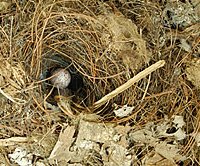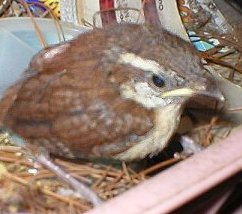June 18, 2007
Monday
 One early spring about five or six years ago when Lynn was redding out her backpack or her car, she shoved a pink knitted acrylic scarf and some other items into a plastic storage bin in a stack beside the door into the kitchen. It didn’t take long for a Carolina wren pair to start using the bunched up fabric as a nesting place. They hauled in twigs and branches, building up a structure like the one shown at left. They raised one set of chicks that year, and every year a pair, perhaps the same pair, has returned to repeat the process.
One early spring about five or six years ago when Lynn was redding out her backpack or her car, she shoved a pink knitted acrylic scarf and some other items into a plastic storage bin in a stack beside the door into the kitchen. It didn’t take long for a Carolina wren pair to start using the bunched up fabric as a nesting place. They hauled in twigs and branches, building up a structure like the one shown at left. They raised one set of chicks that year, and every year a pair, perhaps the same pair, has returned to repeat the process.
I become aware of it each year the first time I go out into the garage for some mundane purpose and startle the mother. She darts out of the nest, sometimes brushing so close that she startles me, because in the six or so months since the last crop of chirpies hatched I’ve forgotten about them. I peer into the space, usually still empty. After that, if I’m observant, I’ll see one or the other of the pair bringing more material to the nest, sprucing it up for the season.
Soon there will be gray speckled eggs. I’ll know this because the mother’s swift exit will be accompanied by loud and insistent calling, as if she is trying to get me to follow her instead of raid the nest. Next, she’ll be sitting on the eggs for longer and longer periods, fed by the male. It gets to the point that she leaves only if, in going about my business in the garage and peering too long at her, I make what she perceives as an aggressive move.
The hatchlings emerge after a few weeks, all fuzz and fur and beady little eyes. This is when we have to leave the window up a few inches, so the parents can go back and forth any time they need to. I’ve gone out some mornings to find one of them hopping up and down on the roof of my car, trapped in the garage when the door came down for the night. The babies seem to chirp incessantly, the volume increasing as they sense one of the parents returning with food.
 Finally, Chirpy Day arrives. Suddenly there’s a commotion of squawking and trilling. The mother is hopping up and down as one by one the chicks emerge. At left you see this year’s most reluctant hatchling, so willing to stay in the nest that it allowed Ron to approach, focus the camera, and get the shot. The chicks are uncertain and unsteady, and invariably at least one of them falls behind the shelving or skitters under a car.
Finally, Chirpy Day arrives. Suddenly there’s a commotion of squawking and trilling. The mother is hopping up and down as one by one the chicks emerge. At left you see this year’s most reluctant hatchling, so willing to stay in the nest that it allowed Ron to approach, focus the camera, and get the shot. The chicks are uncertain and unsteady, and invariably at least one of them falls behind the shelving or skitters under a car.
Today was Chirpy Day, and after the first flurry of activity we could hear two of them flapping from behind stored items along both long walls. Evidently the mother can count, because she kept coming to the entrance of the garage and emitting her sharp, insistent cry. We moved things aside and found both chicks. Ron had to scoop one up in his hands and give it a shove out into the sunlight.
Here’s the point in the essay where I start drawing the comparisons between avian and human maternal behavior. Every year I observe how energetic the mother is in her efforts to push the babies out of the nest, how she screams at them if they linger on the ground under the tree and will not rest until they’ve all spread their wings and made it up into the branches. For weeks she’s nurtured them and protected them, risking her own life to do so. But when Chirpy Day comes, she’s just as energetic in shoving them out.
My chick, Lynn, was sixteen the year of our first Chirpy Day. She’s headed toward twenty-two now, partly out of the nest. She’s living at school this summer and hasn’t spent more than a single night under our roof since Christmas. I was on the phone with her several times today. She and her roommate Amy were on an impromptu road trip, driving to Blacksburg, Virginia to fetch Amy’s boyfriend.
She called first to ask a question about the operation of my portable GPS, temporarily in her possession to aid her weekend trip to Scranton to see one of her friends. I had the feeling that the call was more about letting me know where she was going than any real need to figure out how to adjust the volume on the GPS. She hadn’t asked my permission to undertake the trip. When I was her age I would have been required to do so, and permission would most likely have been withheld by my worrywart, overprotective mother. Chances are, of course, that I would have gone anyway and just not told her. I’m happy that Lynn has the self-confidence both to decide what she wants to do with a sunny summer day when she’s not working and the desire to share with me what she’s about.
There was an update call (they were turning back at Hagerstown because the boyfriend’s ride back next Sunday suddenly became unavailable), and a call when they arrived “home” (that would be the townhouse they occupy just off campus). They’d visited an antique/collectible/junk store near the Maryland line and bought a large cardboard cutout of Beauty and the Beast, to be placed on the foyer wall where a tapestry of Leonardo’s Vitruvian Man once hung, departed now along with the roommate with whom they’d had a falling out and whom they banished.
I’ve noticed over the years that once the Carolina wren chicks are harassed and harangued up into the trees by their parents, we never see them together again. There’s no gathering at the little pink scarf again, no succeeding generations of chirpies having family celebrations. I’ve tried to be as intentional and as energetic as the Carolina wren mother in showing my chick how to use her wings. But I’m glad I don’t have to withdraw so completely from her life.